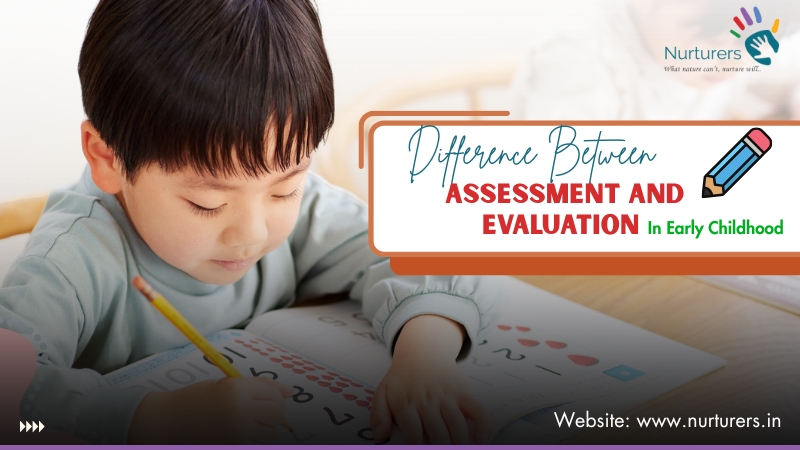In early childhood education, assessment and evaluation are often used interchangeably, but they serve different purposes. Assessment is a continuous process of observing and documenting children’s growth, development and skills — especially useful for identifying and supporting Learning Disability in Children to promote individual learning. Evaluation, on the other hand, is a broader judgment about the effectiveness of programs, teaching strategies, or overall learning outcomes. Understanding the difference helps educators and parents focus both on each child’s unique progress and on improving educational practices as a whole.
What is Assessment?
Assessment in early childhood is an intentional and continuous process of observing, documenting, and reflecting on a child’s growth, development, and learning journey. It is not about assigning grades or labels, but about understanding how a child learns, what they know, and what interests and motivates them.
At Nurturers, we use various forms of assessment, such as:
- Observations: Watching children as they play, interact, and solve problems in real-world contexts.
- Portfolios: Collecting samples of a child’s work over time to see growth and change.
- Developmental checklists: Tracking milestones to ensure children are on track.
- Conversations and storytelling: Talking with children to understand their thinking and feelings.
Assessment supports teachers and parents to make informed, responsive decisions that meet each child’s unique needs and promote holistic development.

What is Evaluation?
Evaluation is a structured and often standardized process used to measure a child’s skills, knowledge, and progress against defined criteria, learning standards, or program goals. Unlike ongoing assessment, evaluation typically happens at specific points, such as:
- End of a term or school year
- Before transitioning to a new grade
- When screening for special education or intervention services
Evaluations may include standardized tests, formal developmental screenings, or program-wide performance reviews. The goal is to determine how well a child, program, or intervention is working, and whether adjustments or additional supports are needed.

How Do Assessment and Evaluation Work Together?
Though different, assessment and evaluation are closely linked in high-quality early childhood programs.
Assessment provides daily insights into each child’s learning, temperament, strengths, and areas where they might need help. These insights inform teachers’ lesson planning and teaching approaches, making learning meaningful and child-centered.
Evaluation offers a bigger-picture view, showing whether a curriculum, teaching strategy, or intervention is effective at a group or program level. It helps in accountability and decision-making at institutional or administrative levels.
When used together, they ensure every child receives tailored, evidence-based support while maintaining educational standards and quality.
Difference Between Assessment and Evaluation
In early childhood education, assessment is a continuous, child-focused process that helps teachers observe and document each child’s growth, strengths, and needs to tailor daily learning experiences. Evaluation, however, is a formal and periodic process used to measure how well an educational program, curriculum, or teaching method meets its broader goals and standards. While assessment guides teachers in supporting individual children, evaluation helps administrators and educators improve overall educational quality and effectiveness.
- Assessment is ongoing and individual-focused; evaluation is periodic and program-focused.
- Assessment helps plan and adjust daily teaching; evaluation supports decisions about curriculum and policy.
- Assessment is informal and flexible; evaluation is formal and structured.

How Therapy Addresses Gaps from Assessment and Evaluation
Assessment and evaluation aren’t just about numbers—they highlight where a child might need extra help. This is where therapy becomes so important.
At Nurturers, therapy services use insights from assessments and evaluations to:
- Target specific developmental delays or skill gaps
- Support communication, motor, social, or emotional skills
- Adapt teaching methods and environments for better learning
- Build a child’s confidence and love for learning
For example, if assessments show a child struggles with attention, therapists can design playful activities to build focus. If evaluation shows language delays, speech therapy can directly address them.
By connecting observation, data, and therapy, we create a complete circle of care.
Why It Matters for Parents and Educators
Understanding the difference between assessment and evaluation helps parents and educators to:
- Advocate for child-friendly, developmentally appropriate practices rather than over-reliance on tests
- Interpret results correctly, knowing that a child’s potential cannot be captured by numbers alone
- Use data constructively: assessment data to inform daily teaching and evaluation data to improve programs and services
- Support children emotionally, ensuring they see learning as joyful exploration rather than pressure to perform
At Nurturers, we emphasize the importance of using these tools ethically and holistically, always keeping each child’s emotional well-being, confidence, and curiosity at the heart of the process.

Conclusion
In early childhood, both assessment and evaluation are crucial, but each serves a different role. Assessment helps educators and parents understand children as individuals, shaping teaching and interventions that nurture their natural growth. Evaluation ensures programs and strategies are effective and equitable.
By balancing both, we create learning environments that celebrate each child’s journey, respect their pace, and unlock their fullest potential. At Nurturers, our commitment is to blend professional expertise with compassion, ensuring that every child is seen, supported, and inspired to thrive.

